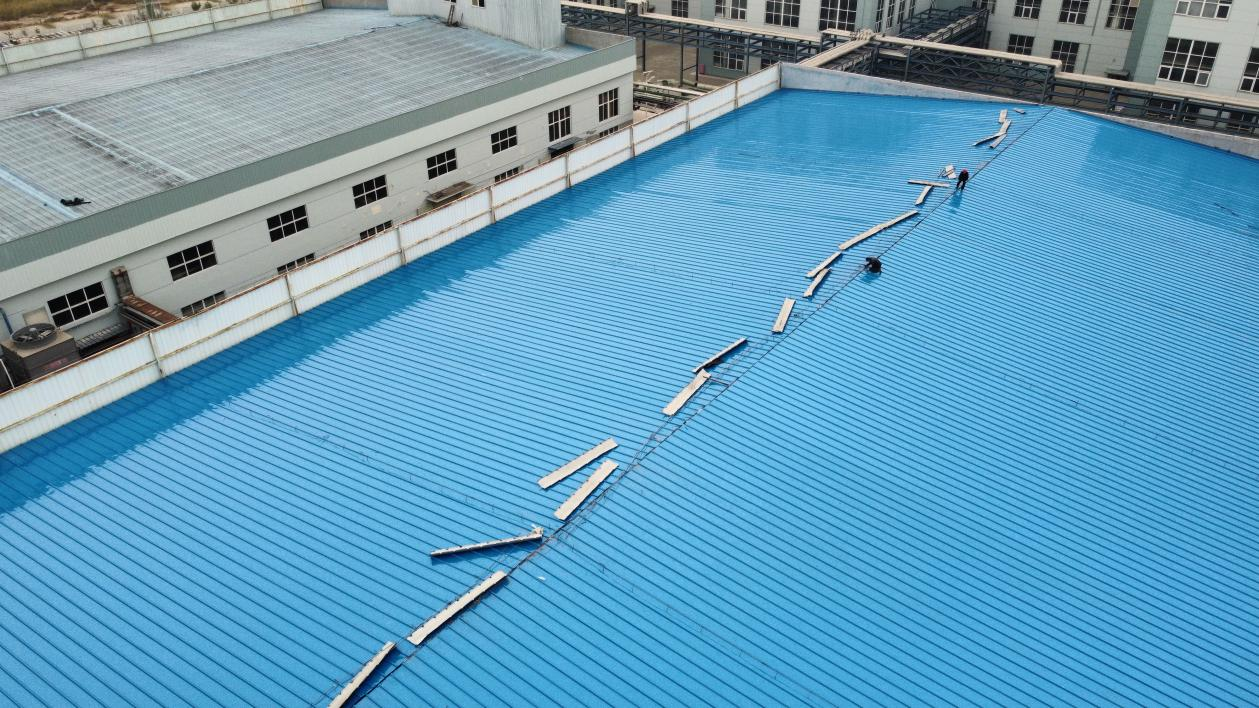In the world of medicine making, a factory roof does more than just keep the rain out. It is a vital part of keeping the environment controlled and following the rules. A roof problem can cause disastrous results. For example, it could lead to product contamination, weakened cleanroom safety, and broken equipment. What’s more, it can cause expensive production shutdowns that break strict GMP (Good Manufacturing Practices) rules. Because this work is so delicate, choosing a roofing material that ensures lasting strength isn’t just a choice. It is a must-have.
Drug factories create a very tough environment for ordinary building materials. Many things contribute to this problem. High humidity, fumes from chemical work, and—most importantly—regular cleaning with strong sterilizing chemicals all play a part. This mix speeds up the roof’s wear and tear faster than in any other field. Because of this, there is a pressing demand for a genuinely corrosion-proof roof that has solid strength and needs little upkeep.
Among these issues, the most non-stop problem is the daily attack from a mix of things.
Being constantly around the acids, alkalis, and solvents used for making products and cleaning wears down standard metal coatings fast. This leads to early failure. Besides that, a constant level of moisture makes things even harder for the roof’s structure.
Lots of moisture and frequent steam cleaning encourage chemical reactions. These reactions cause fast rusting and material decay.
Good Manufacturing Practices have clear rules. First of all, roofing materials must not rust, peel, or drop bits that might dirty the clean production area. Also, the surface needs to be solid and simple to clean. This is so that germs cannot grow on it.
Many common roofing materials just can’t handle these tough conditions. They do not last long. Thus, they need to be replaced often, which causes production to stop and creates a risk of contamination. It is very important to understand these weaknesses. This helps you make a smart choice for a new building or when upgrading.
The paint on these common panels has tiny holes in it. These small gaps let in damaging chemicals and moisture. Rust can then form and spread unseen under the paint, which eventually puts the cleanroom environment at risk.
Plastic options have their own problems. While traditional UPVC can resist some chemicals, it often can’t handle the high heat needed for certain tasks. It can also bend over time. This ruins the airtight seals that are so important for controlled spaces.
Even top-quality metals are not perfect for this job. While good against normal moisture, even high-grade stainless steel can be damaged by the strong, specific chemical mixes used in pharmaceutical cleaning. This can cause small pits and, in the end, failure.
JIELI’s TSP Film-Coated Steel Sheet was made just for the toughest factory jobs. It offers a totally new way to keep a roof in good shape. This technology was designed from the start to fix the problems of older materials.
Our technology doesn’t use a simple spray-on paint that can fail. Instead, it permanently attaches a special, modified polyester film to a galvanized steel center. We use a unique glue, developed over five years, for this process. The result is a barrier that is completely airtight, solid, and physically impossible to get through. This smooth film physically separates the steel from all harmful substances, giving it total protection.
The benefits of this special design are perfect for the strict needs of drug facilities.
Complete Chemical Resistance: It is certified by CNAS to handle being soaked in strong acids, alkalis, and salts for 168 hours with no damage. This ensures it will stand up to the strongest cleaning agents.
JIELI is a worldwide expert in modern roofing solutions. We have special production lines made only for our TSP technology. Our dedication to good work is proven by our success in the world’s toughest industrial settings and by our following of the highest global standards. When you choose JIELI, you invest in a future for your facility that is strong, compliant, and dependable.
A: TSP roofing helps with GMP standards in three key ways. First, its solid, smooth film surface is simple to clean and sterilize and stops germ growth. Second, the material is stable and doesn’t drop particles, so it won’t contaminate the production area. Finally, it is extremely durable. This ensures the cleanroom stays physically secure over the long term and prevents leaks that could ruin the controlled conditions.
A: The main money-saving benefit is a much lower Total Cost of Ownership (TCO). A regular coated steel roof might need to be fully replaced every 2-3 years because of corrosion. Our TSP sheets, however, have a 15-year warranty. This saves the repeated costs of materials and labor. Most importantly, it prevents the huge financial losses that happen when production has to stop for a roof replacement. You usually see a return on your investment within a few years, just by avoiding one replacement.
A: Yes, completely. TSP sheets were created for harsh chemical environments. They went through tough third-party tests (CNAS certification). These tests involved soaking them for a long time in strong acids (like sulfuric and hydrochloric acid), alkalis (like sodium hydroxide), and salts. They showed no signs of damage, fading, or wear. So, this makes them a great choice for handling the strong chemicals and regular cleaning routines found in pharmaceutical plants.
